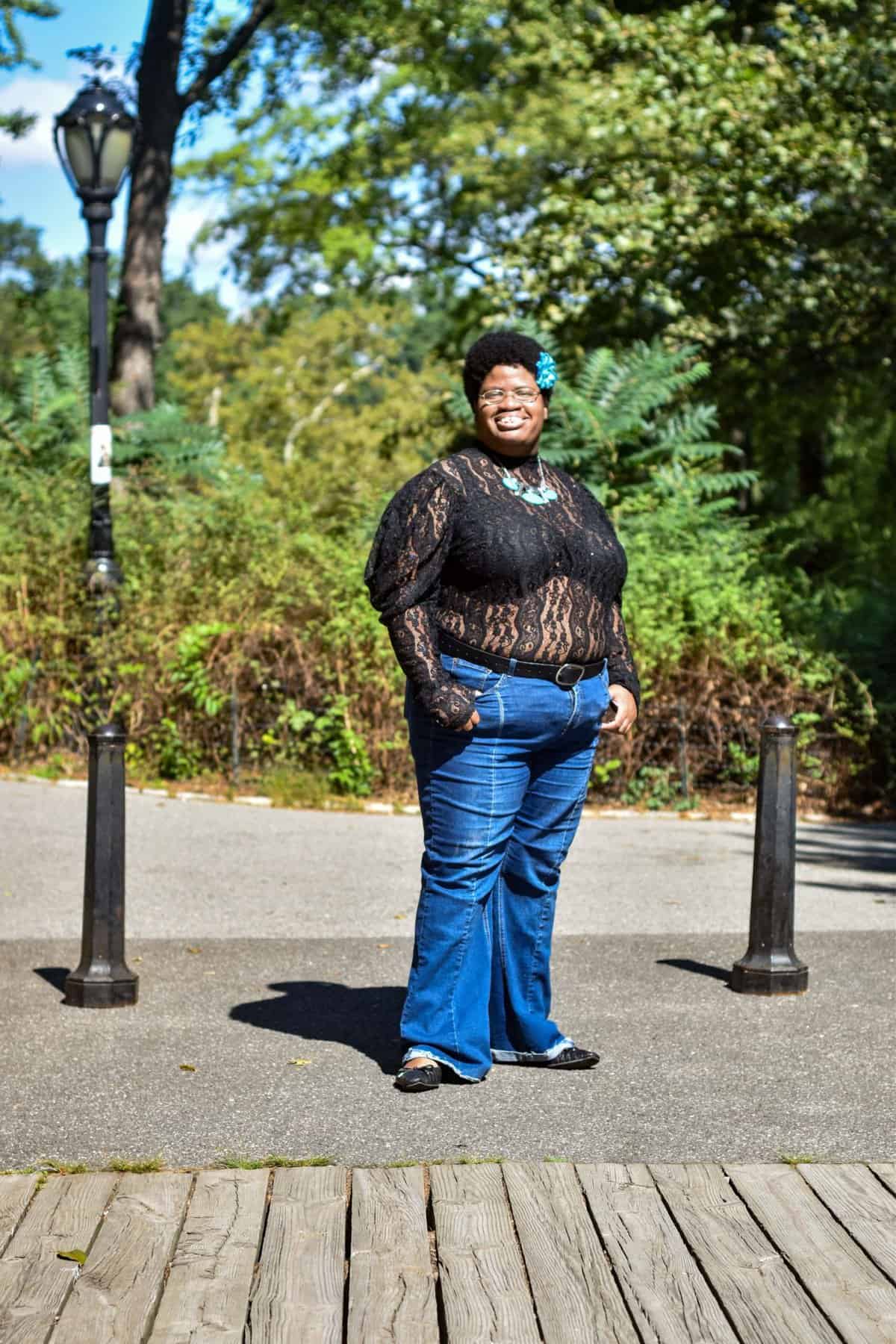Turning the Page: Meet Rooted in Rights’ New Editor-in-Chief, Denarii Grace!
CONTENT NOTE: brief mention of domestic abuse (no details)
I began with singing. Then I swam in songwriting. By the time I graduated from elementary school, I was riding the waves of poetry and playwriting. I would be in grad school before I dove into screenwriting in earnest, but I’d loved film since high school. And I always knew that I’d write a book one day. (Working on it!)
For as long as I can remember, I’ve always been a storyteller. The truth of who I am—and my attempts at running from that truth—has led me down a winding path that finds me here, with you. Like most children, I discovered storytelling as a means of stretching my imagination, nurturing my creative muscles. As life became too real, through a series of profound traumas, storytelling became a protective covering, a way of escape. It—specifically Buffy the Vampire Slayer, my favorite show of all time—literally saved my life.
There are many parts of my journey that I wish were different, but I am proud of where it has brought me. It allows me the privilege to serve my community in my new capacity as Editor-in-Chief of this very blog, Rooted in Rights.
I applied for this job in what has probably been the most tumultuous period ever in my personal life, as I deal with the traumatic aftermath of a domestic abuse experience. I didn’t know what to expect, particularly in a saturated industry—and in a job market rife with trouble, both good and bad. But even as I struggled (and continue to), I just knew that I had to keep going…somehow.
I reflected, very recently, on what has kept me going through the years. What has kept the fire burning as an artist, as a community educator, as someone who fights—in my own ways—for total liberation? How have I not given up: on my creative pursuits, on my career, on my communities, on freedom? My ancestors, certainly. And the friendships, family of origin and chosen, and networks I’ve built along the way. That keeps me alive, like Buffy, literally.
But what keeps me in the fight? A knowing, deep within me, that this is the work I’m meant to do. I am in this place, in this time for a reason. I am needed, as we all are. And being in community with other multiply marginalized people, other activists, culture creators, and truth tellers is a wonderful reminder that I am not alone. We are in this together.
It is in that spirit that I envision my time here at Rooted in Rights.
I was a writer first. I’m still a writer; that experience is a significant part of how I approach editing. What would I want if I were on the other side of this screen? Before I think about pitch structure, search engine optimization, and publishing schedules, I think about community. How do I want to behave in community? How do I want to be treated? How do I want others treated? Many people think that editing requires ruthlessness and callousness, but I reject those white supremacist, patriarchal ideals. It is possible to be firm and kind, commanding and understanding. It is possible to have standards and give grace (particularly if we want to avoid perpetuating ableism). That is the world I want to live in, so that is how I approach all of my work.
The community I hope to build at Rooted in Rights will not forget our history. It will honor our elders and dead, it will remember their stories. But it will not wallow in the past. It will learn from its mistakes and, firmly planted in the present, march—limping, stimming, and rolling—toward a just future.
My descriptivist orientation is rooted in pro-Blackness, anti-ableism, anti-colonialism, and working class politics. In the simplest terms, descriptivism is an approach to language that observes how language is actually used, as opposed to how language should be used (prescriptivism). I believe in writing to communicate and telling our stories the way they need to be told. I have standards: I use punctuation a certain way, certain phrasings are less optimal than others for clarity, emoting, and story structure, and derogatory slurs are, of course, a no-go. However, I also believe in abandoning those standards when warranted. Rules are meant to be broken, after all.
As a result, Rooted in Rights will continue its tradition of an absence of in-house writing standards. Come as you are, as they say. If there is basic structural cohesion (which I can help foster!) and we understand what you’re trying to say, that’s what matters most. Because when we nitpick over the rules, we just might be leaving out the most vulnerable and least heard.
Lastly, in general I am looking for stories—reflecting past, present, and future—that go, as the explorers in Star Trek like to exclaim, “where no one has gone before.” What topics never (or almost never) get visitation? Which angles of common stories do you yearn for someone to notice? Who among us is regularly getting left behind? What message do you believe our community (or our accomplices) needs to heed? What morsel of hope do you wish for us to hold on to? Where should we direct our righteous anger? Where do you believe we should go, and how do we get there?
And think about how you want your story told. Most of what we publish is in the form of personal essays that enlighten, agitate, and encourage. But the blog is also interested in reported and investigative pitches, short fiction, creative nonfiction, and interviews!
In addition, June is Pride Month, Caribbean Heritage Month, and African-American Music Appreciation Month, among others! There is absolutely time to publish those stories before June ends. We only publish a few stories per month, but that shouldn’t deter you from sharing your wisdom, knowledge, and calls-to-action with us. Many topics are evergreen and can be published at any time of year.
My hope is that Rooted in Rights continues to grow into one of the premier media organizations for Deaf/Hard of Hearing, Blind/Low Vision, disabled, chronically ill, and Autistic communities. (I will usually shorten that to just “disabled,” I promise.) “One of” because I also reject the bludgeoning capitalist hammer of scarcity: there is room for us all.
Not literally, of course. I can’t approve every pitch that makes its way to my inbox, for a variety of reasons. But, if you are disabled, I welcome you to share what you think is important! Introduce yourself (including your pronouns if you care to share). Your pitch should lay out, as best as you can in no more than two or three paragraphs, the five W’s and H: who, what, when, where, why, and, when applicable, how.
I want to be able to imagine the final piece without a first draft. I want to be able to feel the anger if you’re talking about a personal trauma or a grave systemic injustice. I want to be able to smell the ocean near your home or taste your grandma’s Hoppin’ John or your uncle’s homemade sofrito. You get the idea. And if you hit send only to realize you didn’t hit every mark? Don’t fret. Descriptivism, remember? If it’s good and we have the space for it, that’s what’s most important. You can pitch me here.
I consider it an immense privilege to take on this role. I am excited (and nervous!) to work with this team and all of you. My hope is that I do it the best justice possible, for you, for us. For community. Onward and upward!
In solidarity,
Denarii Grace (she/they – mix it up!)
Editor-in-Chief, Rooted in Rights
About Rooted In Rights
Rooted in Rights exists to amplify the perspectives of the disability community. Blog posts and storyteller videos that we publish and content we re-share on social media do not necessarily reflect the opinions or values of Rooted in Rights nor indicate an endorsement of a program or service by Rooted in Rights. We respect and aim to reflect the diversity of opinions and experiences of the disability community. Rooted in Rights seeks to highlight discussions, not direct them. Learn more about Rooted In Rights



Congrats! What a powerful raw and beautiful introduction 🙌🏽♥️💕♥️